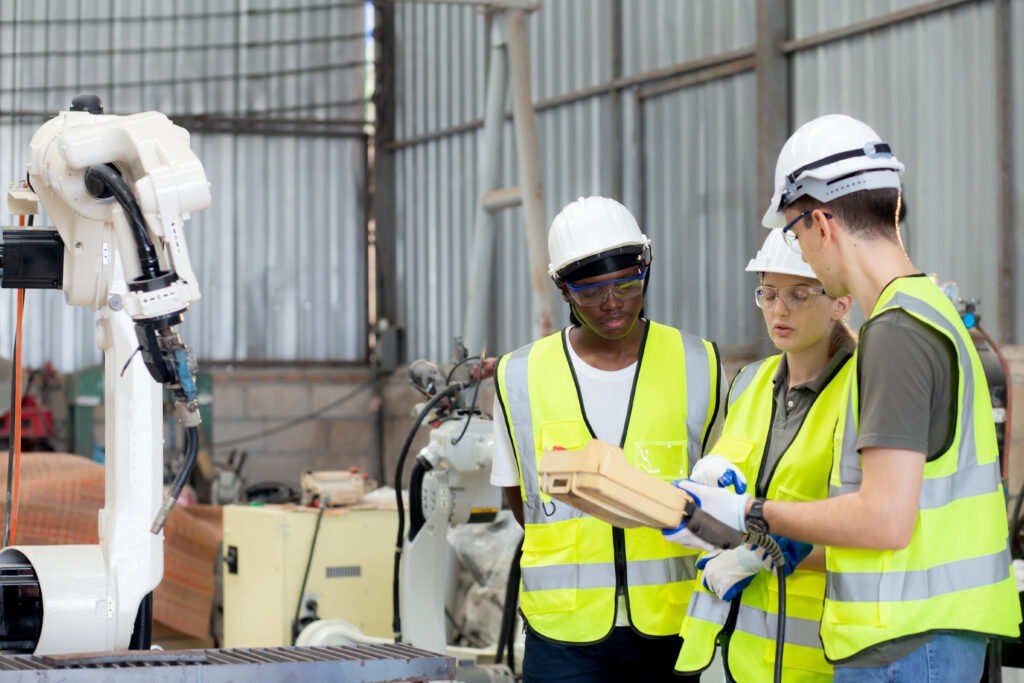
Q&A with CEO of Skills Ontario
Mario Cywinski
Digital Transformation Economy Innovation & Technology Leadership Operations People and Skills Aerospace Automotive Construction Electronics Manufacturing Packaging artificial intelligence colleges continuous improvements economic environment. Editor Pick future technology governments grassroots level jobs of the future labour groups large companies manufacturing companies manufacturing space post-pandemic economic recovery school boards skilled trades Skills Ontario small business supply chain supply chain shortages technological revolutionsPlant spoke with Ian T. Howcroft, CEO, at Skills Ontario about what the association does, and what it sees as in-demand skills and why training is important.

Photo: monkeybusinessimages / iStock / Getty Images Plus
Plant spoke with Skills Ontario, which is an organization that connects with communities at the grassroots level by preparing youth for the jobs of the future. It partners with school boards, colleges, small business, large companies, labour groups, and governments to help tomorrow’s workforce develop skills needed for a career in skilled trades.
Plant discussed everything to do with important skills with Horcroft, to see what the future holds.
Plant: What are the most in demand skill during the post-pandemic economic recovery.

Ian T. Howcroft, CEO, at Skills Ontario /
Photo: Skills Ontario.
Howcroft: Manufacturing and construction trades remained strong throughout the pandemic and continue so including machining, millwrights, carpenters, and electricians. While service sector jobs, particularly in hospitality (chefs, restaurant service) and hairstyling are surging back with the re-opening of the economy. Finally, despite global layoffs in the sector, the pure technology skills are still in very high demand including coding and cloud computing.
Plant: What do you think manufacturer’s need to do to fix their staffing shortages?
Howcroft: Be proactive. Get involved with organizations like Skills Ontario to help engage and build their talent pipeline. No need to re-invent the wheel. Skills are in the schools, by doing presentations, having events, and generating excitement. We need more good employers to step up and hire. Be sure to sponsor, volunteer, contribute materials/equipment, hire, train; rinse and repeat. Ultimately, poaching people from one another is no longer a viable strategy for the long-term.
Plant: How important is training for manufacturing companies?
Howcroft: It’s very important. With the rapid advancement of technology, the competitive landscape and the demand for skills, employers must be involved in training and helping to facilitate life-long learning.
Plant: Do you see AI (future technology) further impacting staffing/skills in the manufacturing space?
Howcroft: Yes. It’s difficult to know how AI will impact staffing and skills within the manufacturing space, but it will impact it (and already has). It is likely that the manufacturers that are best able to harness these new technologies, will be the best able to increase their productivity and be most successful in the future.
As with previous technological revolutions, many jobs will be disrupted, and new jobs will emerge and evolve. In manufacturing specifically, AI is already used to analyse data for predictive maintenance and safety. In the future it is likely AI will penetrate many aspects of manufacturing. From a skills perspective, skills associated with working with and leveraging AI for continuous improvements will be in higher demand. These will be high value skills. Technology will become even more important in all that we do.
Plant: How much of an impact are supply chain shortages on manufacturing and it’s staffing?
Howcroft: Manufacturers are still experiencing latent supply chain shortages resulting from pandemic and demographic related skills shortages. These skills shortages meant that manufacturers could not produce sufficient parts and supplies to keep up with demands, which caused a ripple effect throughout the manufacturing supply chain.
One high profile example was the micro-chip shortage that continues to affect the automotive supply chain, which was further exacerbated by geopolitical tensions between the USA and China. Supply chain challenges add delays, cost increases and the need to make significant changes to plans.

Photo: narith_2527 / iStock / Getty Images Plus
Plant: How can tomorrow’s workplace be ready for a job in the manufacturing sphere?
Howcroft: The manufacturing sector in Canada is quickly adapting to changes in the economic environment. It’s very technology intensive, fast-paced and critical to our economic success as a country. Careers in manufacturers will continue to be in high demand and become increasingly high-value as the deployment of advanced technologies continues to accelerate.
Meanwhile, many of the skills and competencies that are in high demand in the manufacturing sector are also sought after in other industries including construction, technology and even service (teamwork, problem solving, use of technology). Manufacturers should be engaged in the talent pipeline at an early age to foster the next generation of skilled trades and technology leaders by engaging with groups like Skills Ontario; hiring apprentices, co-op students; and providing ongoing training to keep pace with the quickly evolving landscape.
Plant: Anything to add?
Howcroft: Skills Ontario’s mission statement is “to champion and stimulate the development of world-class technological and employability skills in Ontario youth.”
Diversity, equity, and representation are top priorities for Skills Ontario. We are looking forward to continuing to work with communities across Ontario to ensure that we are providing equal opportunities for all youth and building a diverse and robust skilled workforce.
Plant: Can you speak about your background and how you came to Skills Ontario?
Howcroft: I joined Skills Ontario as CEO in January 2018. Previous roles were at Canadian Manufacturers and Exporters (CME), heading CME’s Provincial Operations and Corporate Counsel as senior vice-president, and led several strategic initiatives to improve and support the health and safety, diversity, and workforce training in the manufacturing and industrial sectors.
I have experience working in advocacy, government relations, and public policy for the manufacturing and industrial sectors. As CEO of Skills Ontario, I am driven to build and expand skill development initiatives across the province.
_____________________
Mario Cywinski is the Editor of Plant, MRO, and Food and Beverage magazines, and a member of the Automobile Journalists Association of Canada. He has over 15 years of editorial experience; five years of MRO experience; over 20 years of automobile industry experience, and small business industry experience. Contact him at mcywinski@plant.ca.
